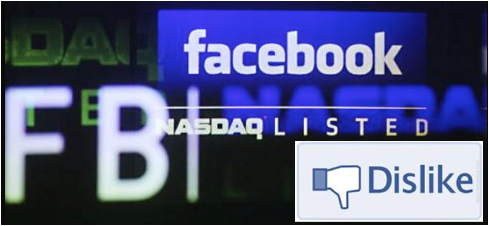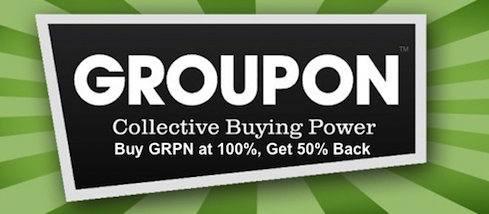About 18 months ago stocks were fueled by the Facebook, Groupon, and the smart phone app frenzy (i.e. Angry Birds). None of the above companies are actually included in the Technology Select Sector SPDR ETF, but the prospect of a new tech boom was enough to lift the entire sector.
And while the tech sector has continued to move higher, it has left Facebook, Groupon and others in the dust. Why? Allow me to republish some research notes previously reserved for subscribers.
Facebook Warning: Published May 11, 2012
“Facebook (FB) is expected to go public on Friday, May 19. The media will gladly spread the frenzy, but I'd like to point out a few nuggets to put Facebook's insane valuation into perspective:
- Assuming a valuation of $100B, FB will trade at 33x advertising revenues. Google trades at 5.5x.
- At $100B, FB will be worth more than: Caterpillar, American Express, Home Depot, Walt Disney and even McDonalds. In fact, 15 components of the mighty DJIA have a market cap of less than $100B.
- The market value of Google at its IPO was "only" $27B
- Apple currently trades around 3.8x sales. The same metric applied to FB would put its valuation at $15B.
To some degree the social media bubble is reminiscent to the 1999 tech boom. Most social media companies are valued based on promises more than established accounting standards. Recent IPO's of Groupon, Pandora, Yelp, and Zynga created a lot of hope during the first couple of days of the IPO and fizzled thereafter.

Will FB await the same fate? You can't predict the extent of any frenzy, but the amount of fizzled frenzies dwarfs that of sustainable ones. My bold prediction is that FB will loose at least 30% of its IPO price by sometime in 2013."
Well, it turns out I was wrong. Since its May 2012 IPO ,Facebook shares have fallen as much as 61% (from a high of $45 to a low of $17.55). Facebook's market cap is now $44 billion.
Groupon Warning: Published December 17, 2010
It was my belief that the Groupon movement (group coupons) is dangerous for the economy and unsustainable. This was contrary the most of Wall Street's outlook. I picked on James Altucher, a popular tech cheerleader, to contrast our difference of opinions.
“Altucher doesn’t believe there’s a new social media/coupon bubble. This time is different because Groupon's rejection of Google's $6 billion bid is ‘the dawn of a new and improved internet bubble. Unlike the bubble of the late 90s, though, this one is based on fundamentals, not irrational exuberance'.
It's ironic that Groupon's success and refusal of Google's advance is seen as the dawn of a new era. Groupon has a killer business model, which is a goldmine for Groupon, but poison for healthy economic growth.
This new way of buying nurtures frugality and robs restaurants and other retail stores of their pricing power. Groupon is feasting on a deflationary trend while wizards like Altucher see the company as a gateway to the new and improved economy.
According to Altucher this is ‘not a bubble, it's a real significant boom.’ It's a boom all right, we'll just have to see whether it's an economic or deflationary boom. My money is on the later.”

Since its November 2011 IPO Groupon shares have fallen from a high of $31.14 to a low of $4. Groupon’s current market cap is $3 billion, half of what Google was willing to pay for the company.
Technology Sector at 11+ Year High. Why?
The Facebook, Groupon, smart phone app boom is deflated, so why has the tech sector moved on to an 11+ year high?
A look at the top holdings of the Technology Select Sector SPDR ETF (XLK) may hold the answer.
Apple, IBM, and Google account for 34% of XLK and trade at or near all-time highs.
Microsoft, AT&T, and Verizon account for 19% of XLK and, like the Nasdaq-100, trade at or near a 10-year high.
Former highflyers like Cisco, EMC, Hewlett Packard, Corning, Yahoo, Broadcom, Dell, Applied Materials, Sandisk, Juniper Networks and others continue to trade near the lower end of their 15-year range.
It appears that a few strong companies mask the performance of many weak companies. That’s not the definition of a strong market or sector.
|